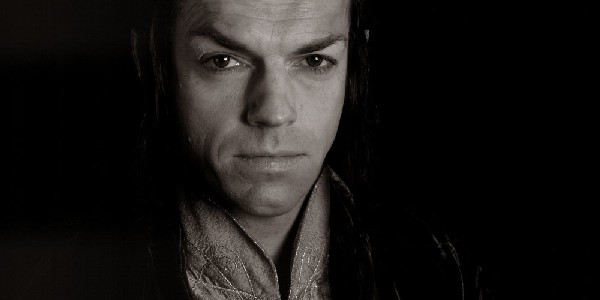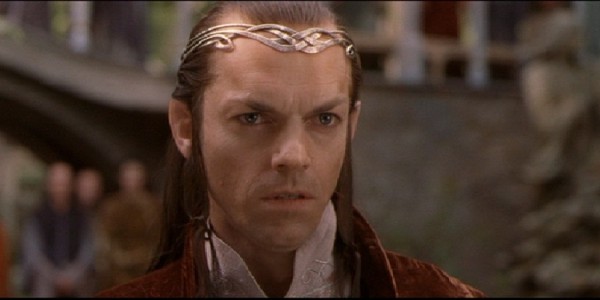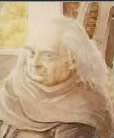Elrond Peredhil by atalante_star
Who is Elrond in the film – Stern Elf-Lord and soldier intent on ruining his daughter’s love-life. Telepathic.

Elrond in the book – Stern Elf-Lord, one of the wisest of elf-kind and revered by many in Middle-earth.

Comparison
While Elrond is seen more often in the film, his influence is more pervasive in the book.
Prologue
Elrond is seen fighting in the Battle at the end of the Second Age, sometimes heading a row of Elves, and sometimes standing near Gil-galad.
Three is Company
In the chapter “Three is Company”, Frodo’s heart was moved by the desire to see the house of Elrond Half-elven, showing that at least Elrond’s name was known to the hobbit. Furthermore, Gandalf’s letter told Frodo that Elrond would advise him if Gandalf himself did not arrive at Rivendell. Gandalf even whispered to Bill that Elrond’s house would be a good place for the pony to end up.
The Fellowship at Rivendell
Two chapters / scenes from the book and film are set in Rivendell – Many Meetings and Council of Elrond.
Arrival at Rivendell
In the film, Elrond’s power is diverted to Arwen when she calls down the flood of the Bruinen onto the Nazgûl. In the book, this is Elrond’s job, though Gandalf admits that he added the ‘finishing touch’ of the white horses and riders.
“‘Elrond commanded it,’ answered Gandalf. ‘The river of this valley is under his power, and it will rise in anger when he has great need to bar the Ford.'” (FotR, Many Meetings)
In both the film and the book, Frodo is the first of his party to arrive at Rivendell – carried by Glorfindel in the book and Arwen in the film. In both he is healed by Elrond, a master in the healing arts, who finally managed to find a splinter of the Morgul blade, buried deeply in Frodo’s flesh.
Elrond, Lord of Rivendell
Elrond’s face was described in the book as ageless, neither old nor young:
“Though in it was written the memory of many things both glad and sorrowful. His hair was dark as the shadows of twilight, and upon it was set a circlet of silver; his eyes were grey as a clear evening, and in them was a light like the light of stars. Venerable he seemed as a king crowned with many winters, and yet hale as a tried warrior in the fulness of his strength. He was the Lord of Rivendell and mighty among both Elves and Men.” (FotR, Many Meetings)
While Hugo Weaving provides a good surface comparison to that description, he lacks the calm agelessness, the quality of living through, and understanding, many millennia.

Elrond’s customarily seat, in a great chair at the end of the long table of the dais of the Hall at Rivendell, is mentioned only in the book, as is his special chair in the Hall of Fire. He entered all rooms first, with all others following him, save Arwen.
Elrond’s foretelling ability is also only mentioned in the book, though the film gives Elrond a different kind of psychic ability, shown through his telepathic conversation with Galadriel in TTT.
“And to what he will come in the end not even Elrond can foretell” (FotR, Many Meetings)
The Council of Elrond
In this section, both film and book contain very similar information – though in different places and in a different order. The book contains simply the “Council of Elrond” chapter, while the film contains similar information split between the “Many Meetings” and the “Council of Elrond” scenes.
– The Welcoming: In both film and book, Elrond presides over the Council, and welcomes all members with very similar words. He explains what needs to be done to understand the purposes of the Enemy, and lets the Council know that this path is their doom – “There is naught you can do, other than to resist, with hope or without it.” (FotR, The Council of Elrond) – or in the more dramatic words of the film – “Middle-earth stands upon the brink of destruction. None can escape it. You will unite or you will fall. Each race is bound to this one fate, this one doom.” (The Council of Elrond, Getting Down to Business)
– Fate or command? What is made clear in the book is that Elrond did not call the Council members to Rivendell. All the members of the Council found their own ways to the Last Homely House as they believed that Elrond, the greatest lore-master on Middle-earth, was the one who could help them: “in this very nick of time, by chance as it may seem. Yet it is not so. Believe rather that it is so ordered that we, who sit here, and none others, must now find counsel for the peril of the world.” (FotR, The Council of Elrond)
In the film, however, it seems as that Elrond has gathered people to him, giving out a totally different impression of his role – “You’ve been summoned here to answer the threat of Mordor.” (Council of Elrond, Getting Down to Business)
– Elrond through the ages: The Council of Elrond chapter in the book includes a lot of history that is moved to elsewhere in the film (the Prologue and Many Meetings). However, overall, a similar level of information is given. Elrond tells of the Second Age and the forging of the Rings of Power, and gives a short account of the later Second Age – the times that he had written so much about in his Books of Lore. He ended with an account of the Last Alliance, and his own part in the Battle. He was the herald of Gil-galad, and present at the Battle of Dagorlad. He saw the last combat on Orodruin, and saw Isildur cutting the Ring from Sauron‘s finger. Later, he stood with Gil-galad and Círdan in trying to persuade Isildur to give up the Ring.
The film goes through a similar history, but promotes Elrond to be the only person with Isildur at the Cracks of Doom.
“I led Isildur into the heart of Mount Doom, where the Ring was forged, the one place it could be destroyed.
“Cast it into the fire! Destroy it!”” (Many Meetings, Gandalf and Elrond Confer)
However, I feel that it is only in the book that shows the true age and importance of Elrond to the Elves, and to Middle-earth:
“My memory reaches back even to the Elder Days. Eärendil was my sire, who was born in Gondolin before its fall; and my mother was Elwing, daughter of Dior, son of Lúthien of Doriath. I have seen three ages in the West of the world, and many defeats, and many fruitless victories.” (FotR, The Council of Elrond)
The use of the ancient names, Lúthien, Dior, Elwing and Eärendil, really emphasise the time-spans Tolkien is talking about – especially to anyone who has read the Silmarillion. Not only is Elrond one of the most powerful elves in Middle-earth, but he has taken part in some of the most momentous events through the history of Middle-earth, and he was born to two of the most legendary elves of all time. Elrond’s knowledge and power becomes truly understandable, as does his world-weariness.
Elrond, Rivendell and Middle-earth
One complete change between book and film concerns how the outside world views Rivendell. The book tells that Rivendell has become dissociated from the other lands of Middle-earth. In some cases, Rivendell had become a dream, a road rarely travelled.
“Long have I wandered by roads forgotten, seeking the house of Elrond, of which many had heard, but few knew where it lay.” (Boromir, in FotR, The Council of Elrond)
Little mention is made of this in the film. Instead, Elrond says to Gandalf that Sauron’s Eye is rested firmly on Rivendell.
Elrond and Tom Bombadil
One very interesting section in the book is when Elrond admits that he had forgotten about Tom Bombadil.
“In those lands i journeyed once, and many things wild and strange I knew. But I had forgotten Bombadil, if indeed this is still the same that walked the woods and hills long ago, and even then was older than the old. … He is a strange creature, but maybe I should have summoned him to our Council.” (FotR, The Council of Elrond)
Of course, this section does not occur in the film, with pretty much every mention of Tom Bombadil excised from the film scripts.
The strength of Elves is fading …
The Council of Elrond sections in both the book and the film show that the Elves are not invincible, that their power was fading:
Galdor: “What power still remains lies with us, here in Imladris, or with Círdan at the Havens, or in Lórien. But have they the strength, have we here the strength to withstand the Enemy, the coming of Sauron at the last, when all else is overthrown?”
“I have not the strength,” said Elrond; “neither have they.”
“The if the Ring cannot be kept from him for ever by strength,” said Glorfindel, “two things only remain for us to attempt: to send it over the Sea, or to destroy it.” (…)
“But Gandalf has revealed to us that we cannot destroy it by any craft that we here possess,” said Elrond. (…)
“The westward road seems easiest. Therefore it must be shunned. It will be watched. Too often the Elves have fled that way. Now at this last we must take a hard road, a road unforeseen. There lies our hope, if hope it be. To walk into peril – to Mordor. We must send the Ring to the Fire.” (FotR, The Council of Elrond)
And in the film:
Elrond: “This evil cannot be concealed by the power of the Elves. We do not have the strength fight both Isengard and Mordor… Gandalf – the Ring cannot stay here.” (Many Meetings, Gandalf and Elrond Confer)
Elrond also makes it clear, in the book, that he cannot wield the Ring – “I fear to take the Ring to hide it. I will not take the Ring to wield it.” (FotR, The Council of Elrond)
“Some hope that the Three Rings, which Sauron has never touched, would then become free, and their rulers might heal the hurts of the world that he has wrought. But maybe when the One has gone, the Three will fail, and many fair things will fade and be forgotten. That is my belief.” (FotR, The Council of Elrond)
This belief of Elrond’s, that the One Ring being found will cause the doom of the elves – either through Sauron recapturing the Ring, or through its destruction and the consequent destruction of the Three Rings, is reflected only in the film by Galadriel, not Elrond.
The strength of Men is gone
Book Elrond does not seem to have any dislike or disdain for Men, even though he knows Men can be weak. In contrast, film Elrond seems dismissive and scornful of Men:
“Men. Men are weak. The race of men is failing. The blood of Númenor is all but spent, it’s pride and dignity forgotten. It is because of men, the ring survives. I was there, Gandalf. I was there three thousand years ago…
Isildur took the Ring. I was there the day the strength of men failed…” (…)
“Isildur kept the ring. The line of kings is broken. There’s no strength left in the world of men. They’re scattered, divided, leaderless…” (Many Meetings, Gandalf and Elrond Confer)
Elrond also buys into the film version of Aragorn’s story – that he has chosen not to become King:
“He turned from that path a long time ago. He has chosen exile…” (Many Meetings, Gandalf and Elrond Confer)
The Choosing of the Fellowship
Elrond, the Lord of Rivendell, makes it very clear what Frodo decides to take on.
“But it is a heavy burden. So heavy that none could lay it on another. I do not lay it on you. But if you take it freely, I will say that your choice is right; and though all the mighty elf-friends of old, Hador, and Húrin, and Túrin, and Beren himself were assembled together, your seat should be among them.” (FotR, The Council of Elrond)

It was Elrond who decreed the membership of the Fellowship in the book. However, in the book, he did not want Pippin to go – as the youngest Hobbit, he suggested that Pippin should go back to the Shire and spread the word of danger. The film, however, shows a natural coalescence of the Fellowship after Frodo says that he will go to Mordor, with Elrond simply affirming the event.
When the Fellowship was leaving, Elrond in the book again warned them of danger, and reminded them that only Frodo actually had a charge laid on him. Any other member could back out, tarry, or take different roads as chance allowed. He then let them go with the blessing of Elves and Men and all Free Folk, and told them that he would send letters to all his friends in the world requesting their aid.
Lothlórien
In the book, the Fellowship’s later passage through Lothlórien was facilitated by Elrond’s letter.
“And since you come with an Elf of our kindred, we are willing to befriend you, as Elrond asked” (FotR, Lothlórien)
Conclusions
Elrond, in a way, is not much changed from book to film. He says similar things in similar places, and generally acts as the Lord of Rivendell should. However, underneath the surface, the film Elrond is not so deep a character. The book Elrond is a figure of legend, not only the Lore-Master of Rivendell, but the son of Eärendil and Elwing, and the great grandson of Lúthien and Beren. Even though he is only half-elven, he comes from the noblest of elven blood and he is accounted by elves and other races alike as one of the wisest and greatest of elf-kind. He is Elrond of Rivendell, Bearer of Vilya.
Our Gallery has a separate section devoted to Elrond. It also has the screencaps of Fellowship of the Ring and the Extended DVD.
A transcript of Lord Of the Rings: Fellowship Of the Ring can be found in our Film Fun & Facts section.
A summary of Lord Of the Rings: Fellowship of the Ring can be found in Elrond's Library.
You can also check out some pictures of Hugo Weaving in our Gallery, or read a short biography in our Film, Fun & Facts section.
Some articles that are related to this character:
- The Middle-earth Section has a Family Tree of The House of Elwë and Olwë, as well as articles on his daughter Arwen; his ancestors Eärendill and Elwing and The Battle of the Last Alliance.
Forum threads related to this character / actor:
- Elrond fans can take a look at Favorite Character/Actor: The Elves and Elrond Fans... Come and Get It! in the Casting Forum, or discuss the character in depth in Tragic Character Flaws .
Take a look at how some artists saw this character:
- Elrond at the Council by Bakshi
- The Council of Elrond by Caras
- Elrond by Dark Mage
- Elrond by Deana Kay
- Elrond by Faith Greenleaf
- Elrond by Green
- Elrond Remembers Gil-Galad by Kaluta
- Elrond by Nellas of Doriath
- Elrond by Rankin-Bass
Not pleased with the book or the movie, take a look here:
For a humorous take on Gimli, read Cassie Claire's Very Secret Diary of Elrond.
You can also install the Elrond Theme.









